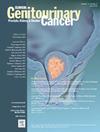上尿路上皮癌手术治疗后不同种族的生存结果
IF 2.3
3区 医学
Q3 ONCOLOGY
引用次数: 0
摘要
目的不同种族和民族群体在各种泌尿生殖道恶性肿瘤的生存结果方面存在差异。在此,我们试图研究根治性肾切除术(RNU)后上尿路膀胱癌(UTUC)患者按种族分层的长期生存结果。方法利用ROBUUST(ROBotic surgery for Upper tract Urothelial cancer Study,上尿路膀胱癌机器人手术研究)登记处进行多中心回顾性分析,确定了2015年至2022年间在美国、欧洲和亚洲12个中心接受RNU治疗的UTUC患者。根据种族(白人、黑人、西班牙裔和亚裔)对患者进行分层,并使用单变量分析、多变量考克斯回归模型和卡普兰-梅耶尔分析评估主要相关结果,包括无复发生存期(RFS)、无转移生存期(MFS)和总生存期(OS)。结果 1446 例接受 RNU 治疗 UTUC 的患者(白人 652 例,黑人 70 例,西班牙裔 87 例,亚裔 637 例)被纳入我们的分析。Cox回归模型显示,病理结节分期是RFS(HR 2.25;P = .0010)、MFS(HR 2.50;P = .0028)和OS(HR 5.11;P < .0001)的重要预测因素。结论与其他泌尿生殖道恶性肿瘤不同,我们的研究未能证明在接受RNU治疗的UTUC少数种族群体中存在生存劣势。此外,接受RNU治疗的白人、黑人、亚洲人或西班牙裔UTUC患者在RFS、MFS和OS方面也未发现明显差异。本文章由计算机程序翻译,如有差异,请以英文原文为准。
Survival Outcomes by Race Following Surgical Treatment for Upper Tract Urothelial Carcinoma
Objective
Discrepancies in survival outcomes of various genitourinary tract malignancies have been documented across different racial and ethnic groups. Here we sought to examine long-term survival outcomes of patients with upper tract urothelial carcinoma (UTUC) following radical nephroureterectomy (RNU) when stratified by race.
Methods
A multicenter retrospective analysis using the ROBUUST (ROBotic surgery for Upper tract Urothelial cancer Study) registry identified patients undergoing RNU for UTUC between 2015 and 2022 at 12 centers across the United States, Europe, and Asia. Patients were stratified by race (white, black, Hispanic, and Asian) and primary outcomes of interest-including recurrence-free survival (RFS), metastasis free survival (MFS) and overall survival (OS) - were assessed using univariate analysis, multivariate Cox regression modeling, and Kaplan-Meier analysis.
Results
1446 patients (white n = 652, black n = 70, Hispanic n = 87, and Asian n = 637) who underwent RNU for treatment of the UTUC were included in our analysis. Cox regression modeling demonstrated pathologic nodal staging to be a significant predictor of RFS (HR 2.25; P = .0010), MFS (HR 2.50; P = .0028), and OS (HR 5.11; P < .0001). When using whites as the reference group, there were no significant differences in RFS, MFS, or OS across racial groups.
Conclusions
Unlike other genitourinary tract malignancies, our study failed to demonstrate a survival disadvantage among minority racial groups with UTUC who underwent RNU. Furthermore, a significant difference in RFS, MFS, and OS was not identified across whites, blacks, Asians, or Hispanics with UTUC who underwent RNU.
求助全文
通过发布文献求助,成功后即可免费获取论文全文。
去求助
来源期刊

Clinical genitourinary cancer
医学-泌尿学与肾脏学
CiteScore
5.20
自引率
6.20%
发文量
201
审稿时长
54 days
期刊介绍:
Clinical Genitourinary Cancer is a peer-reviewed journal that publishes original articles describing various aspects of clinical and translational research in genitourinary cancers. Clinical Genitourinary Cancer is devoted to articles on detection, diagnosis, prevention, and treatment of genitourinary cancers. The main emphasis is on recent scientific developments in all areas related to genitourinary malignancies. Specific areas of interest include clinical research and mechanistic approaches; drug sensitivity and resistance; gene and antisense therapy; pathology, markers, and prognostic indicators; chemoprevention strategies; multimodality therapy; and integration of various approaches.
 求助内容:
求助内容: 应助结果提醒方式:
应助结果提醒方式:


